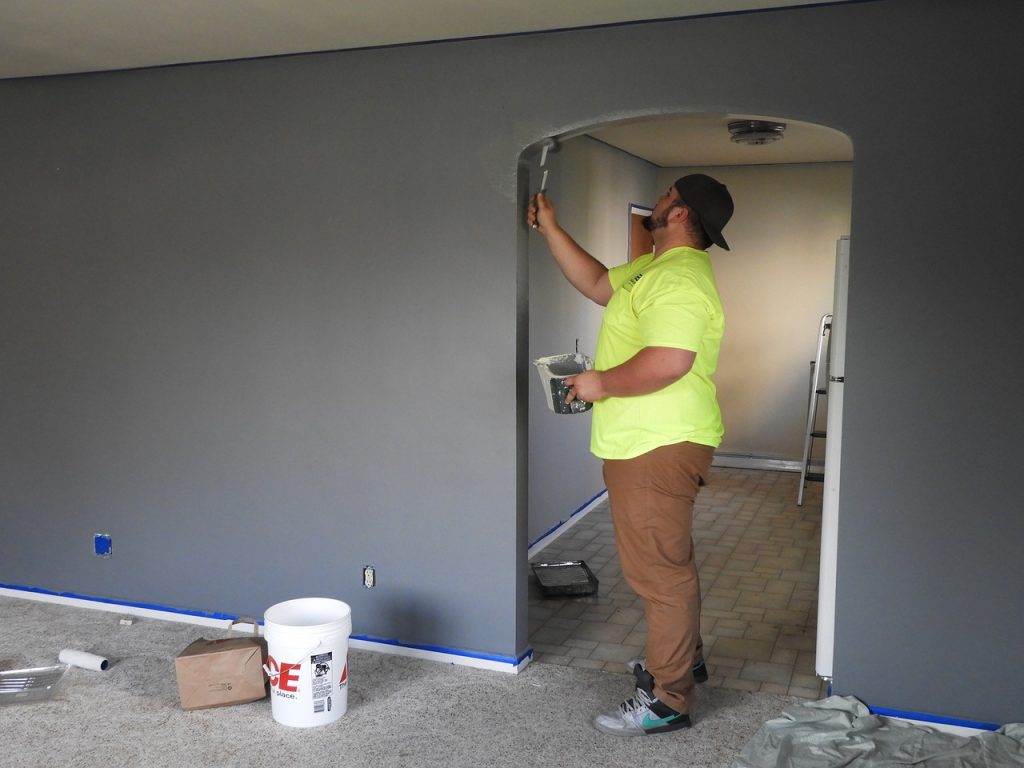So, you’re thinking about renovating your home, but you can’t help but wonder if all that time, money, and effort is going to actually bring any improvement. It’s a valid concern, after all. Renovations can be a significant undertaking, and the last thing you want is to pour all that energy into something that will ultimately fall flat. Well, fear not, because in this article, we’re going to explore the true meaning of renovation and whether it truly leads to improvement. Brace yourself for some unexpected insights and a new perspective on this age-old debate. Renovating your home can bring numerous advantages and benefits. Let’s explore the different ways in which renovation can enhance your property.

This image is property of pixabay.com.
Advantages of Renovation
Increase in property value
One of the key benefits of renovating your home is the potential increase in property value. By updating and modernizing your living space, you can attract potential buyers and command a higher selling price. Renovations that focus on improving the kitchen, bathrooms, and overall curb appeal tend to yield the highest returns on investment.
Enhanced functionality and comfort
Renovation allows you to improve the functionality and comfort of your home. You can reconfigure the layout to create more open living spaces, add additional rooms or storage areas, or make changes to better suit your lifestyle. Whether it’s a larger kitchen for hosting gatherings or a cozy reading nook, renovation gives you the opportunity to customize your home to meet your specific needs and desires.
Improved energy efficiency
Renovating your home provides an opportunity to incorporate energy-efficient features and technologies, such as energy-efficient windows, insulation, HVAC systems, and appliances. These upgrades can result in long-term energy savings and reduced utility bills. Not only does this benefit your wallet, but it also helps to reduce your environmental footprint.
Enhanced aesthetic appeal
Aesthetics play a crucial role in our overall enjoyment of our living space. Renovation allows you to update the look and feel of your home, ensuring that it aligns with your personal style and preferences. Whether you opt for a contemporary design, a rustic charm, or a classic elegance, renovation lets you transform your home into a visually pleasing sanctuary that reflects your individual taste.
Customization and personalization
One of the most significant advantages of renovation is the ability to personalize your living space. When you renovate, you have the opportunity to incorporate unique features, finishes, and design elements that truly reflect your personality and lifestyle. From custom cabinetry to bespoke lighting fixtures, renovation enables you to create a home that is uniquely yours.
While the benefits of renovation are plentiful, it is important to consider the potential disadvantages and challenges that may arise.
Disadvantages of Renovation
Cost and expense
Renovation projects can be expensive, especially if they involve major structural changes or high-end finishes. It’s essential to set a realistic budget and carefully consider the potential costs before diving into a renovation project. Unexpected expenses can arise, so it’s wise to have some additional funds set aside as a contingency.
Disruption and inconvenience
Renovations can be disruptive, causing temporary inconveniences such as loss of access to certain areas of your home, dust, noise, and the need to temporarily relocate during major renovations. It’s essential to plan accordingly and communicate with your contractor to minimize disruptions as much as possible.
Unforeseen challenges
No matter how well you plan, renovation projects can encounter unforeseen challenges. This could include issues like hidden structural damage, electrical or plumbing problems, or complications with obtaining necessary permits. It’s important to be prepared for these potential setbacks and have a contingency plan in place.
Time-consuming process
Renovation projects can be time-consuming, especially if they involve multiple areas of your home or extensive renovations. It’s crucial to have a realistic timeline in mind and understand that unexpected delays can arise. Patience and flexibility are essential throughout the renovation process.
Potential for over-improvement
While renovating can add value to your home, there is also a potential for over-improvement. This means investing more money into your home than what you can reasonably expect to recoup when you eventually sell. It’s essential to be mindful of the real estate market in your area and the value ceiling for properties in your neighborhood.
Before embarking on a renovation journey, there are several important factors to consider to ensure a successful and satisfying outcome.
Factors to Consider Before Renovating
Budget
Determining your budget is a crucial first step when considering a renovation project. Take into account not only the cost of materials and labor but also any unexpected expenses that may arise during the project. Consider consulting with a financial advisor to determine a reasonable budget based on your financial situation and goals.
Scope of renovation
Deciding on the scope of your renovation project is essential. Determine the areas of your home you wish to renovate and prioritize them based on their importance and your budget constraints. Consider whether you want to tackle the entire house or focus on specific rooms or areas.
Timeline
Understanding your desired timeline for the renovation is important to set expectations and plan accordingly. Consult with your contractor to get an estimate of how long the project may take, allowing for potential delays and unexpected issues that may arise.
Practicality
Consider the practicality of the renovation project. Will the changes you want to make align with your lifestyle and future plans? Think about the functionality, maintenance requirements, and longevity of the renovations.
Return on investment
Evaluate the potential return on investment for your renovation project. Research real estate trends in your area to determine if the renovations you are planning are likely to increase your home’s value. Consider consulting with a real estate agent or appraiser to get an estimate of the potential increase in property value.
Now that we’ve covered some important factors to consider, let’s compare renovating with the alternative of moving to a new home.
Renovation vs. Moving
Pros of renovating
Renovating allows you to stay in your current home and neighborhood, maintaining the familiarity and connections you have built over time. You can customize and personalize your living space to your liking and avoid the stress and uncertainty of house hunting and moving.
Pros of moving
Moving to a new home offers a fresh start, the opportunity to discover a new neighborhood, and the potential to find a home that better meets your needs and preferences. It can be an exciting adventure that allows you to start anew.
Cons of renovating
Renovating can be a disruptive and time-consuming process. It requires careful planning, budgeting, and oversight. There is also the potential for unforeseen challenges and hidden costs, as well as the risk of over-improvement.
Cons of moving
Moving can be a stressful and expensive endeavor. It involves the search for a new home, packing, hiring movers, and the emotional toll of leaving behind familiar surroundings. There is also the possibility of not finding a home that perfectly meets all your desires and requirements.
Ultimately, the decision between renovating and moving depends on your individual circumstances, preferences, and long-term goals. Consider weighing the pros and cons carefully before making a decision.
Now, let’s explore some popular renovation projects that homeowners frequently undertake.

This image is property of pixabay.com.
Popular Renovation Projects
Kitchen remodel
A kitchen remodel is one of the most popular renovation projects. Upgrading appliances, countertops, cabinets, and flooring can significantly enhance the functionality and appeal of your kitchen. It can also serve as a focal point for entertaining and family gatherings.
Bathroom renovation
Updating your bathrooms can greatly improve the comfort and value of your home. Consider renovating your bathrooms with modern fixtures, stylish tiles, and additional storage options to create a spa-like retreat.
Home expansion
Home expansion projects, such as adding a new room or extending existing living spaces, can provide the extra space you need to accommodate your growing family or changing lifestyle. Whether it’s a new bedroom, a home office, or a larger living room, an expansion can enhance the functionality and value of your home.
Basement finishing
Finishing your basement can significantly increase your usable living space. Transforming your basement into a recreational area, home theater, or guest suite can provide valuable additional square footage, increasing the functionality of your home.
Outdoor space improvement
Improving your outdoor space can create an inviting and enjoyable retreat for relaxation and entertainment. Consider adding a deck, patio, or outdoor kitchen to maximize your outdoor living experience. Landscaping, outdoor lighting, and plantings can also enhance the aesthetic appeal and value of your property.
While renovation projects offer exciting possibilities, they can also present unique challenges. Let’s discuss some of the common challenges and their potential solutions.
Renovation Challenges and Solutions
Structural issues
Discovering structural issues during a renovation can be a major setback. It’s vital to work with a qualified contractor or structural engineer to assess and address any structural concerns. They can provide guidance on the required repairs or modifications to ensure the safety and integrity of your home.
Permit and legal requirements
Renovations often require permits and adherence to building codes and regulations. Failure to obtain the necessary permits and meet legal requirements can result in fines, delays, or even having to undo completed work. It’s crucial to familiarize yourself with the local regulations and work with a contractor who is experienced in navigating these requirements.
Material selection
Choosing the right materials for your renovation project is essential for both aesthetic and functional reasons. Research different materials, finishes, and brands. Consider factors such as durability, maintenance requirements, and cost. Consult with professionals, such as architects or interior designers, to ensure proper material selection.
Contractor selection
Finding the right contractor for your renovation project is crucial. Seek recommendations from trusted sources and thoroughly vet potential contractors. Check their credentials, past projects, and read reviews to ensure they have the necessary expertise and reputation for quality work.
Design and layout
Design and layout decisions can have a significant impact on the overall success of a renovation project. It’s important to carefully plan and consider functional flow, aesthetics, and the specific needs of your household. Working with an experienced architect or interior designer can greatly assist in creating a well-designed space.
Avoiding common renovation mistakes can save you time, money, and headaches. Let’s discuss some of these mistakes and how to avoid them.

This image is property of pixabay.com.
Renovation Mistakes to Avoid
Inadequate planning and research
Insufficient planning and research can lead to costly mistakes and unsatisfactory outcomes. Take the time to thoroughly plan your renovation project, including budgeting, selecting materials, and creating a realistic timeline. Research different contractors, architects, or designers to ensure you’re making informed decisions.
Ignoring the potential for hidden costs
Renovation projects often come with unexpected costs and expenses. It’s crucial to have a contingency fund in place to accommodate unforeseen issues that may arise during the renovation. Additionally, obtaining written estimates from contractors and researching the potential cost of materials can help you budget more accurately.
Compromising on quality to save money
While it’s important to stick to your budget, compromising on quality can lead to regrets in the long run. Opting for cheaper materials, appliances, or contractors may result in subpar results or costly repairs down the line. Strive for a balance between affordability and quality to ensure a successful renovation.
Not considering your future needs
When renovating, it’s essential to consider your future needs. Will the changes you make still meet your requirements in the years to come? Think about factors such as aging in place, accommodating growing children, or potential lifestyle changes. Planning for the future can save you from needing to undertake additional renovations in the near future.
Overlooking the importance of lighting and ventilation
Lighting and ventilation are often overlooked in renovation projects but play a crucial role in the overall ambiance and comfort of your home. Consider incorporating ample natural light through windows and skylights, as well as well-placed artificial lighting. Proper ventilation, especially in areas like bathrooms and kitchens, is essential for maintaining air quality and preventing moisture-related issues.
Determining the success of a renovation goes beyond completion. Let’s explore the key indicators of a successful renovation.
Determining the Success of a Renovation
Achieved goals and objectives
A successful renovation should accomplish the goals and objectives you set at the beginning of the project. Whether it’s increasing functionality, improving aesthetics, or addressing specific needs, evaluate whether your renovation meets these initial objectives.
Positive return on investment
Ideally, a successful renovation should result in a positive return on investment. Assess the impact of your renovation on the value of your home by comparing it to similar properties in your area. Consult with real estate professionals to get an estimate of the increased market value.
Satisfying aesthetic outcome
Aesthetics play a significant role in our overall satisfaction with our living environment. If the final outcome of your renovation project aligns with your vision and brings you joy and satisfaction, it can be considered a success.
Enhanced functionality and usability
A successful renovation should improve the functionality and usability of your home. Evaluate whether the changes you made have made your daily life more convenient and comfortable. Consider if the renovation addressed any particular pain points you had prior to the project.
Renovation trends are continually evolving. Let’s explore some of the current trends that homeowners are embracing.

Renovation Trends
Open concept living spaces
Open concept living spaces continue to be popular, providing a seamless flow between the kitchen, dining area, and living room. This design trend promotes a sense of togetherness and maximizes natural light and space.
Smart home technology integration
The integration of smart home technology is becoming increasingly prevalent in renovations. From automated lighting and security systems to voice-activated assistants, homeowners are embracing the convenience and energy-saving potential that these technologies offer.
Eco-friendly and sustainable features
Sustainability and eco-friendliness are significant considerations for many homeowners. Incorporating energy-efficient appliances, renewable materials, and eco-friendly construction methods can be both environmentally conscious and financially advantageous.
Luxury upgrades and amenities
Luxury upgrades and amenities are sought after by homeowners looking to create a lavish living experience. High-end materials, spa-like bathrooms, gourmet kitchens, and home theaters are just a few examples of luxury features that can elevate your renovation project.
Incorporating natural elements
Bringing the outdoors in by incorporating natural elements is a growing trend. Adding features such as large windows, indoor gardens, or using natural materials like wood and stone can create a calming and rejuvenating atmosphere.
In conclusion, renovation offers numerous advantages, including increased property value, enhanced functionality and comfort, improved energy efficiency, enhanced aesthetic appeal, and customization options. However, it also comes with drawbacks such as cost, disruption, and potential challenges. Before embarking on a renovation project, carefully consider factors like budget, scope, timeline, practicality, and return on investment. Compare the pros and cons of renovating vs. moving to make an informed decision. Popular renovation projects include kitchen remodels, bathroom renovations, home expansions, basement finishings, and outdoor space improvements. Understand and address potential renovation challenges such as structural issues, permit requirements, material selection, contractor selection, and design/layout. Avoid common mistakes by adequate planning, budgeting, and research. Measure the success of your renovation by achieving goals, attaining positive return on investment, satisfaction with the aesthetic outcome, and improved functionality. Stay up-to-date with renovation trends such as open concept living spaces, smart home technology, eco-friendly features, luxury upgrades, and incorporating natural elements. With proper planning, research, and understanding, your renovation project can become a successful and rewarding endeavor.
